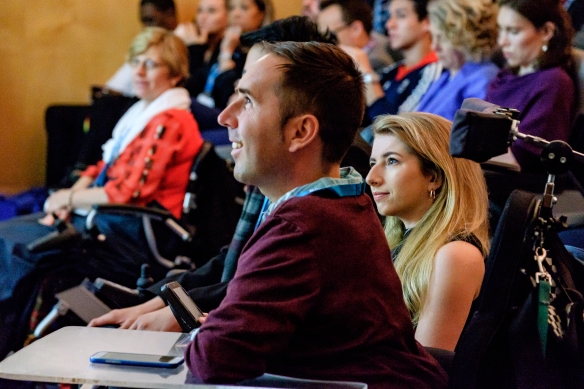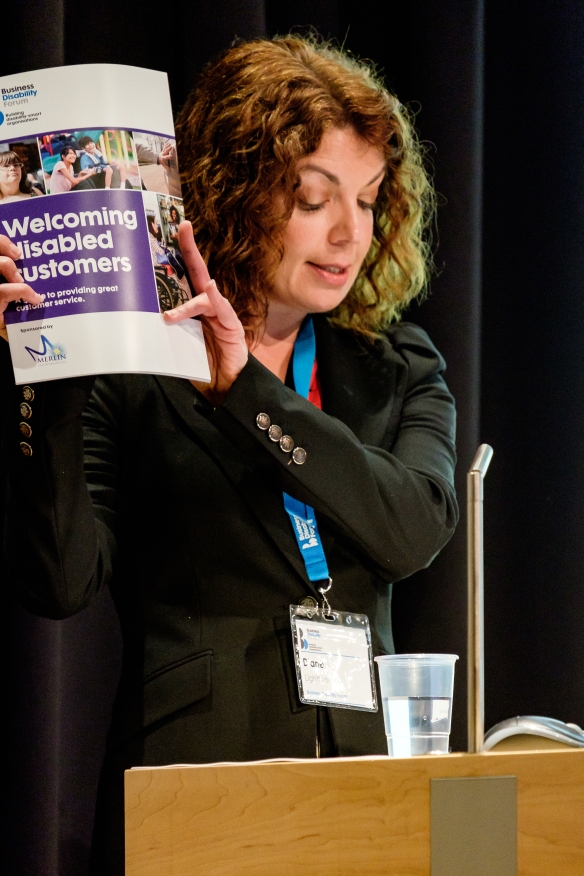By Ebunola Adenipekun
We’re looking forward to hosting our Partners, Members, guests and filmmaking superstars at Business Disability Forum’s Film Festival 2018, supported by Barclays.
We set out a 7 day film challenge earlier this year, themed around “going places”, in terms of travel, career progression and accessibility. The selected finalists of the challenge will show their films at the Film Festival at KPMG on Wednesday 20 June, 2018.
This event will showcase how the next generation of disabled talent perceive and overcome challenges at work, on holiday, and in other areas of life. The winner will be announced on the day.
We took some time out to speak to the finalists to find out what inspired them enter the festival:

Kenny Rei and the Spicy Ladies
‘Kenny Rei and the Spicy Ladies’
Group name: Diversity vs Adversity
University: Manchester Metropolitan University
Course: BA (Hons) Film and TV Production
Bettina Tóth
Please can you tell us a bit about yourself?
My name is Tina Toth and I am the writer and director of ‘Kenny Rei and Spicy Ladies’. I am a second year student at The Manchester Film School and I’d like to work in Film and TV dramas once I finish my studies. I have a really artistic approach to filmmaking; I also do oil paintings and graphic design as well. I am 27 years old and although I live in Manchester, I am originally from Hungary. I am a fan of cinema, arts, literature and video games. When my studies allow it, I like to travel and broaden my knowledge with the culture of foreign countries.
What made you decide to enter the film challenge?
I quite liked the idea of making a film in a relatively short time, and I wanted to try if we can manage to complete everything by the deadline. I was also hoping to get my work seen by the jury and make an impression. Another reason was that we were allowed to experiment with the topic and the way we’d like to express our thoughts about disability.
What was your inspiration behind the film?
Our film depicts life with ADHD and I personally know and have worked with young people who were diagnosed with hyperactivity. I wanted to show that even though they have difficulties with certain tasks, they are able to perform and even outperform their colleagues. I find people with ADHD incredibly creative, humorous, and inspiring. We wanted to film something that shows what’s going on inside their heads, something that is uplifting but thought-provoking, too, at the same time.
When it comes to going places, what has been your biggest barrier and do you feel you have overcome it?
The aim of our film was to show that disability shouldn’t be barrier having success in your workplace or moving up on the career ladder. I think it all depends on the attitude of employers and other employees to make a more comfortable and welcoming workplace for people with either mental or physical disability. We are studying to be filmmakers, and we were taught to be able to bring together all kinds of personalities and talents, and then make something great together. Every workplace should have the same mentality; appreciate the diversity of their employees, use it to their advantage, and then make something great in the end of the day.
Miguel Ramos
Please can you tell us a bit about yourself?
Spanish born and raised, I moved to the UK in 2013. I worked full-time in a restaurant for more than 2 years, until I decided to stop and go back to education – to pursue my dream job! In 2015, I joined the Manchester Film School and now I’m about to graduate from university.
What made you decide to enter the film challenge?
I am always looking for new exciting opportunities to develop my working skills. When I read the basis of the contest and saw that there was a Film Festival in London at the end of the road and so many Industry Professionals, I knew immediately I had to give it a go. Plus, the social theme was another big incentive. My mother has Polio and I’ve always been very sensitized with the difficulties she has to face in her daily routines.
What was your inspiration behind the film?
At the beginning, I wanted to talk about Autism. However, after doing some research we realised it was quite a sensitive matter which would require more pre-production in order to do things right. Tina, our talented Director, came up with the idea of following the daily life at work of a fictional character who has ADHD – giving it a fresh positive look, yet adding the uplifting message promoting diversity in our society.
When it comes to going places, what has been your biggest barrier and do you feel you have overcome it?
Since English is not my mother language, the biggest challenge I had to face happened in 2013 when I moved to the UK – getting used to a new culture and new ways to express my emotions was really hard at some point. However, with time, emotional intelligence and my determination to move forward, I achieved a good balance in my life – and I’ve even finished a university course thanks to the skills I acquired since I moved to England.

Mike
‘Mike’
Group name: Edgar Scukins
University: Manchester Metropolitan University
Course: Filmmaking
Edgar Scukins
Please can you tell us a bit about yourself?
My name is Edgar Scukins. I am from Latvia, but I live, study and work in Manchester.
What made you decide to enter the film challenge?
Yes, one of the main reasons was to share Mike’s story. I am helping him out with mobility scooter repairs. I have known him for over a year. And since the first day I met him, I thought that it would be useful to show people how many things one can achieve, even when diagnosed with cerebral palsy.
What was your inspiration behind the film?
Mike inspires me every day. He is always smiling and I have never seen him sad. When I am struggling with something and begin to complain, I feel slightly ashamed, because I remember Mike immediately.
When it comes to going places, what has been your biggest barrier and do you feel you have overcome it?
I think that the biggest challenge for Mike when he is going places is when something goes wrong with his mobility scooter and he needs to ask for help from people that are passing by. It has happened with him many times. I think that it is still a problem, but since technology is advancing fast, mobility scooters will be made more reliable.

Barrier
‘Barrier’
Group name: Wolf Pack
University: University of Wolverhampton
Course: Film & TV Production/Video and Film Production
William Horsefield
Please can you tell us a bit about yourself?
I first began filmmaking at 12 years old making short films on my mobile phone. I found my passion in filmmaking and studied online about making Visual effects. I spent 6 years mastering VFX and gained lot of experience as I had made over 170 short films before I enrolled into Creative Media Production Extended Diploma Level 3 in York College. I submitted my short films to films festivals and won many awards. In 2014, I submitted a pitch idea to the film competition, Dream To Screen and my idea, ‘Welcome to the Deaf World’ was selecting by the actress Helen Mirren as well as film and TV industry experts. I am veteran of 48/72 hours film challenge as I won most of these competitions that I entered before I enrolled into the Video and Film Production from the University of Wolverhampton.
What made you decide to enter the film challenge?
I love entering the many film competitions as I can but this competition is a bit different and It gave me a chance to make a short film about deaf or other disability awareness in workplace or business. I attended this competition on last year, I noticed that some people in the audience were business owners so I wanted to use my short film to show them that it was not that difficult to work with deaf people.
What was your inspiration behind the film?
My inspiration was coming from some images from google show the art of depression monsters who follow humans and some of deaf people’s experience in working inspired me as well.
When it comes to going places, what has been your biggest barrier and do you feel you have overcome it?
I think meeting with new people who have no deaf awareness is my biggest challenge because when my BSL interpreter is ill, arrives late or doesn’t show this can cause more awkwardness between me and new people. This make it difficult to work together or communicate so, I always pick writing as communication method to talk them but it is very slow and sometimes some people’s handwriting is hard for me to read.
Samuel Ash
Please can you tell us a bit about yourself?
I am currently studying Film & TV Production at the University of Wolverhampton to become a director or a producer. I have a passion for filmmaking and photography, when I grew up enjoying watching films and taking photos, it merged into filmmaking. Adding to my geekiness, I also really enjoy sci-fiction films!
What made you decide to enter the film challenge?
This festival gives an opportunity for us, students and with disabilities to be involved and encouraged us to create a film about our experience and how our film can be assisted to improve access and awareness of Deaf people. It is fun to be part of the relatable challenge with fellow filmmakers!
What was your inspiration behind the film?
The festival gave us the opportunity to create a film that relate our own experience and how we can show the solution to break the barriers deaf people face in their everyday lives. The film is about the barrier, and how it affects Deaf people to get employment. We wanted to create a positive attitude by adding humour.
When it comes to going places, what has been your biggest barrier and do you feel you have overcome it?
The barrier is always communication. It frustrates me when I am not able to communicate to collaborate with hearing peers smoothly which shutter my career process and opportunity to contribute.
I have to overcome this by pushing myself to approach a hearing person and communicate them through gesturing. If it failed, it is OK and I have to figure out another way to communicate them which can be writing down or any communication tool that it may work with this person. Confidence is vital.
I think of the quote: “Communication is the key to personal and career success” Paul J. Meyer.
We’d like to thank all the entrants for taking part and a special thanks to our finalists and our sponsors Barclays.
We look forward to sharing the films!
If you’d like to attend, you can find the details for the festival here.









































 Successes like this are among the many reasons why I would like to encourage as many businesses as possible to see these films. Hearing what can help break down barriers for disabled people – be that technology, collaboration or adjustments – in their own words, is something all businesses should do.
Successes like this are among the many reasons why I would like to encourage as many businesses as possible to see these films. Hearing what can help break down barriers for disabled people – be that technology, collaboration or adjustments – in their own words, is something all businesses should do.